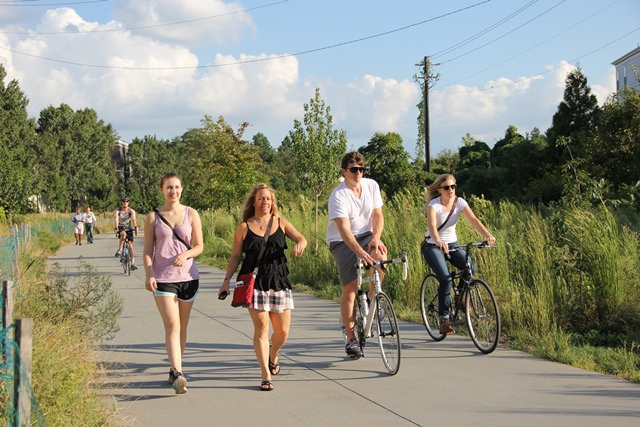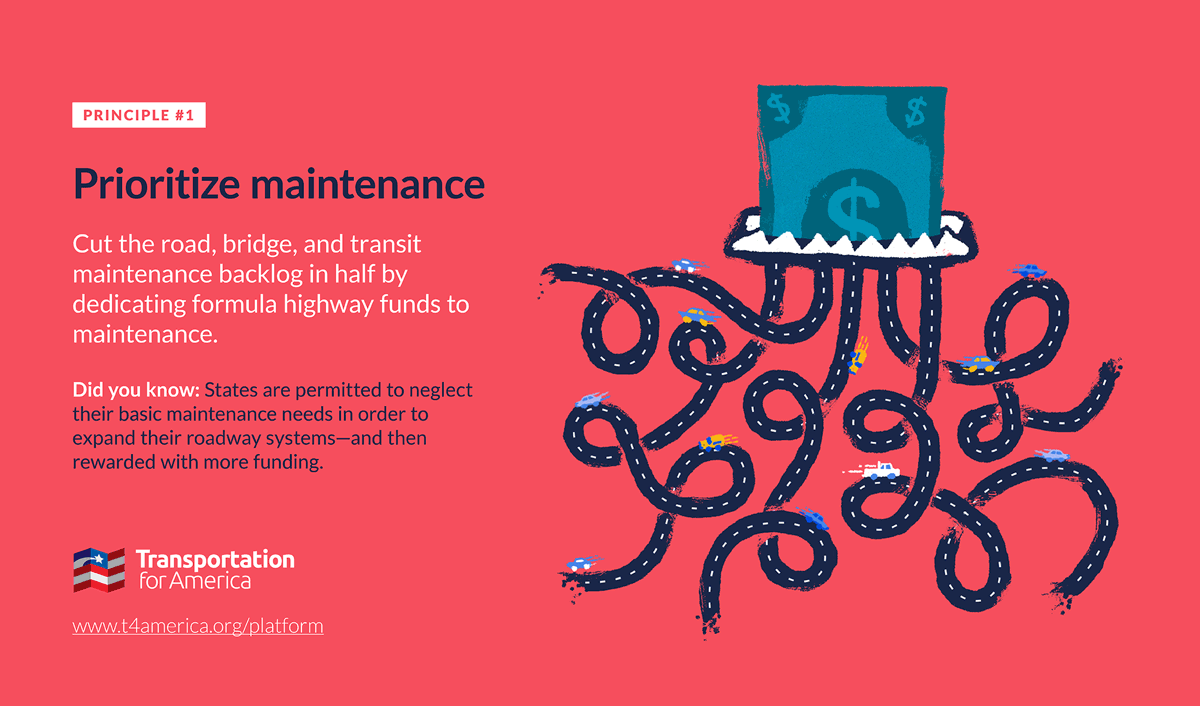Georgia’s legislature moved last night to enable Atlanta to fund new transit & local projects
After an up-and-down last few years when it comes to transportation funding, the Georgia state legislature successfully passed a pared-back bill last night that will allow voters in the City of Atlanta to decide whether or not to raise new funds for expanded transit service throughout the city, in addition to other transportation investments in the city.

Thanks to state legislation, transit could be finally coming to Atlanta’s BeltLine, running alongside the popular trails. Photo via Beltline.org
Under a new law passed late night by the Georgia legislature in the dying hours of the session, the city will be able to put a question on the ballot to finally add transit to the one-of-a-kind Beltline around the city, expand existing bus and rail service, or fund other new transit projects. The city will also be able to raise new funds for streets and highways and the remainder of Fulton County (which surrounds and includes part of Atlanta) will be able to raise new local sales taxes for road and transit projects outside the city.
The legislation (SB 369) enables three new local funding sources, each dependent on approval through voter referenda. 1) The City of Atlanta can request voter approval for an additional half-cent sales tax through 2057 explicitly for transit, bringing in an estimated $2.5 billion for MARTA transit. 2) Through a separate ballot question the city could ask for another half-cent for road projects. 3) And in Fulton County outside the city, mayors will need to agree to a package of road and transit projects and ask voters to approve up to a ¾-cent sales tax to fund the projects.
After a bigger regional bill failed a few weeks ago that would have given the transit ballot authority to more counties and municipalities outside of the core city and Fulton county, the Atlanta Journal Constitution reported that last night’s bill “represents a compromise with GOP lawmakers who opposed an earlier plan put forth by Sen. Brandon Beach, R-Alpharetta.”
That effort earlier in the session would have enabled a larger transit measure in Atlanta and both adjoining counties, Fulton and DeKalb. Opposition to new transit measures — especially in Fulton County — sunk that legislation and when that bill died a few weeks ago, it seemed at the time like the end of the line for new transit funding in this legislative session.
Last night’s compromise bill that emerged from the ashes will enable a new, long-term funding stream for transit in the city of Atlanta, where support is the strongest. If approved, the new funding would allow the largest expansion of MARTA in the system’s history and allow more transit to connect and permeate growing in-town neighborhoods.
LOOKING BACK IN ATLANTA
After an up-and-down last few years for transportation funding, this is a big win for the regional economic powerhouse of metro Atlanta.
T4America members like the Metro Atlanta Chamber have been hearing from their members (and potential recruits looking to locate in Atlanta) how important expanded transit is to the city and region’s future. In our widely-cited story from last year, we chronicled how employers in the city are increasingly locating near transit to attract a younger, talented workforce, including State Farm’s plan to build literally right on top of a northside MARTA station.
Dave Williams, VP of Infrastructure & Government Affairs for the Metro Atlanta Chamber and T4A Advisory Board member remarked, “We’re thrilled that MARTA will be back in expansion mode for the first time in more than 15 years. The measure that passed will give Atlanta the opportunity to generate over $2.5 billion in local funding for transit projects. It’s an extraordinary positive step to create more commuting options and there will be more to come.”
“This success resulted from many partners in our community collaborating, including business interests, civic groups, environmental concerns, labor and trades, and engaged citizens,” he added.
Atlanta Mayor Kasim Reed called the failure of 2012’s massive regional transportation ballot measure that included an enormous list of road and transit projects the biggest failure of his political career. Back in the beginning of 2015 in our 15 things to watch in 2015 series of posts, we pointed to Mayor Reed as a person to watch last year, as he was trying to find a way forward on new transportation funding for the city.
[After 2012’s failed referendum, Reed] has often suggested that Atlanta might instead pair up with a few other nearby municipalities on a separate measure to raise funds for transportation. City of Atlanta and Dekalb county voters strongly favored the 2012 measure, so a joint Atlanta-DeKalb plan could be a possibility to watch for discussion of in 2015.
Which is pretty close to what happened this year.
After that 2012 mega-measure failed, they came close to getting new local funding authority for MARTA included in last year’s broad state transportation legislation which raised $900 million, mostly for road projects. But:
At one point during negotiations there was a provision that would have allowed the cities and counties that contribute to MARTA to increase the sales tax dedicated to the system by 0.5 percent via ballot measures, but this provision was removed from the final bill.
With potentially $2.5 billion to invest in new projects, if approved by the voters, MARTA Board Chairman Robbie Ashe told the Atlanta Journal Constitution that the regional transit agency is already working on a list of projects that could be funded through a new local tax in Atlanta.
“My best guess is the lion’s share would go to expanding the transit on the Beltline,” said Ashe, adding that the city might also contemplate building infill rail stations or extending a rail line by a stop or two.
Because of financial constraints, constructing transit lines along the entire 22-mile circle of the Beltline would likely have to be done in phases, rather than all at once, said Ashe.
This is welcome news, but they’re not finished yet. We’ll be watching closely as the city formulates their plan and begins to put together a campaign for a successful ballot measure, possibly as soon as this Fall.
This post was co-written by Dan Levine and Stephen Lee Davis



















